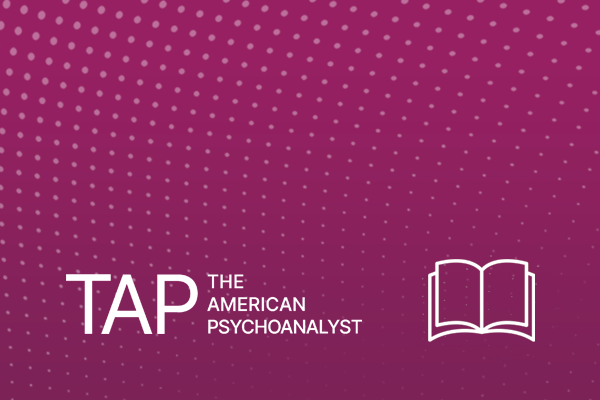Autism Spectrum Disorder (ASD) References
DPE in The American Psychoanalyst (TAP)
- 2016, #4- Gann-Today’s Future Psychoanalytic Education and the DPE
- 2017, #2-Sugarman & Schiller-APsaA’s Department of Psychoanalytic Education
- 2017, #3-Sugarman & Schiller-Standards, Excellence and the DPE
- 2017, #3-Gann-The PSF Committee-Music to the Ears-The Psychoanalytic Scholarship
- 2019, #1-Sugarman-Supervision: An Understated Pillar of Psychoanalytic Education
- 2019, #1-Barron-The Psychoanalyst in the Community
- 2019, #2-Eagle & Goodman-DPE Research Education Section
- 2019, #3-Sugarman-Should Psychoanalytic Candidates Be Taught Psychotherapy
- 2019, #3-Hart, Why Diversities?
- 2020, #1 -Jacobson & Kwawer, Institute Advisory & Consultation Section of the DPE (IACS)
DPE National Directory of Instructors
Early Career Development
Psychoanalytic Psychotherapy Training
Psychoanalytic psychotherapy has been developed, practiced, and taught by psychoanalysts and psychoanalytic psychotherapists from its beginnings. Students and practitioners learn to apply psychoanalytic concepts in a variety of clinical settings with a wide range of patients and clients.
For most mental health professionals, the graduate training experience does not fully prepare one to be a skilled, knowledgeable, and confident therapist. While we continue to learn from our patients throughout our professional lives, we believe that advanced formal training is crucial to our efforts to provide the highest level of clinical competence.
More recently, because of the relative neglect of such training in universities and other training programs, psychoanalytic centers and institutes have developed formal instruction programs in the discipline of psychoanalytic psychotherapy.
While individual programs differ in their specifics, typically they are based upon the core psychoanalytic tripartite training model of didactic seminars, clinical supervision, and personal therapy. Programs are available not only in adult psychoanalytic psychotherapy but also in child and/or child and adolescent psychotherapy.
The following programs affiliated with APsA are designed to enrich psychotherapeutic skills and to provide a background in psychodynamic principles and the theoretical basis of clinical work. Click on the links for more specific information on each program:
Adult Psychoanalytic Psychotherapy
American Institute for Psychoanalysis
Atlanta Psychoanalytic Psychotherapy Training Program
Boston Psychoanalytic Society and Institute, Inc.
Center for Psychoanalytic Studies (Houston)
Chicago Psychoanalytic Institute
Cincinnati Psychoanalytic Institute
Cleveland Psychoanalytic Center
Columbia University Center for Psychoanalytic Training and Research
Denver Institute for Psychoanalysis & The Denver Psychoanalytic Society
Florida Psychoanalytic Center Inc.
Greater Kansas City Psychoanalytic Society, Institute, and Foundation
Michigan Psychoanalytic Institute and Society
The Minnesota Psychoanalytic Society
New Center for Psychoanalysis, Los Angeles
New Orleans-Birmingham Psychoanalytic Center
New York Psychoanalytic Society and Institute
Pittsburgh Psychoanalytic Center
Psychoanalytic Association of New York (PANY) Affiliated with NYU Langone Health
Psychoanalytic Center of Philadelphia
Psychoanalytic Center of the Carolinas
Saint Louis Psychoanalytic Institute
San Diego Psychoanalytic Center (SDPC)
San Francisco Psychoanalytic Psychotherapy Training Program
Seattle Psychoanalytic Society and Institute
Washington Baltimore Center for Psychoanalysis
William Alanson White Institute for Psychiatry, Psychoanalysis and Psychology
Western New England Institute for Psychoanalysis
Child and/or Adolescent Psychoanalytic Psychotherapy
Center for Psychoanalysis Studies (Houston)
Chicago Institute for Psychoanalysis
Cincinnati Psychoanalytic Institute
Columbia University Center for Psychoanalytic Training and Research
Michigan Psychoanalytic Institute
The New York Psychoanalytic Society & Institute
Psychoanalytic Center of Philadelphia
The Psychoanalytic Institute affiliated with the NYU School of Medicine
San Francisco Center for Psychoanalysis
St. Louis Psychoanalytic Institute
Seattle Psychoanalytic Society and Institute
Washington Baltimore Center for Psychoanalysis
William Alanson White Institute for Psychiatry, Psychoanalysis and Psychology
Research Education
Co-sponsored by:
The Research Education Section of the American Psychoanalytic Association, Department of Psychoanalytic Education (APsA-DPE) in collaboration with the Research Committee of the New Center for Psychoanalysis (NCP).
This collection of Research Education Resources serves to provide materials for stimulating interest in topics and research relevant to psychoanalytic education. Our goal is that materials made available here will stimulate critical thinking and will help ground psychoanalytic training in a framework that integrates psychoanalytic knowledge with relevant findings from other disciplines.
1. VIMEO Links to videos of APsA-DPE Research Education Dialogue
2018 – Critical Thinking and Research in Psychoanalytic Education
Presenters: Ellen Rees, M.D. & Otto F. Kernberg, M.D.
Discussant: Andrew J. Gerber, M.D., Ph.D.
Click here to view https://vimeo.com/343120172
2019 – Another Look at Therapeutic Action and Implications for Psychoanalytic Training and Education
Presenters: John Clarkin, Ph.D. & Leon Hoffman, M.D.
Discussant: John H. Porcerelli, Ph.D.
Click here to view https://vimeo.com/342846068
2020 – What Do We Mean by Corrective Emotional Experience and What is its Therapeutic Role?
Presenters: Glen Gabbard, M.D., Christopher Christian, Ph.D., and Mark Hilsenroth, Ph.D.
Click here to view https://vimeo.com/552729941
2021 – The Role of Mentalization and Reflective Function in Psychoanalytic Treatment:
TFP & MBT
Presenters: Elizabeth Allison, Ph.D., Peter Fonagy, Ph.D., and Otto Kernberg, M.D.
Discussants: Morris Eagle, Ph.D., and Diana Diamond, Ph.D.
Click here to view https://vimeo.com/554990470
2. Links to Additional Resources
- The APsA Scientific Paper Prize established in 2004, the APsA Scientific Paper Prize is an
annual award for the most outstanding empirical paper relevant to psychoanalysis published in English in a
peer-reviewed journal. - APsA’s CORE Bibliography
- The International Psychoanalytical Association (IPA) Open Door Review of outcome and process
studies in psychoanalysis - Rapaport-Klein Study Group: A rich archive of programs from 1963 by leaders in the field who shared an interest in studying theoretical and clinical aspects of psychoanalysis and psychology, especially from a research point of view.
- Peter Lilliengren’s compilation of RCT’s involving psychodynamic treatment or
interventions - Psychoanalytic Research Consortium: This website introduces the Psychoanalytic Research Consortium and its resources including its library of recorded cases available to qualified researchers.
- IPA The Research Training Programme: This multi-day program “provides attendees with opportunities for constructive consultation with regards to ongoing or planned research projects. Aims also include providing useful training in empirical and practically meaningful approaches to psychoanalytic research.”
3. Course Curriculum Resources
- Psychodynamic Psychotherapy: Empirical Research and Evidence for Its Efficacy (Pretsky)
- Research and Critical Thinking in Psychoanalysis (Pretsky)
4. Additional Sections Under Development
- An archive of papers discussing research education or pedagogy
- Archived materials from other sources: This project is a developing one. Sections will be
elaborated, modified, and updated as new materials become available.
Teaching Psychoanalytic Perspectives on Aging
Introduction to Curriculum Resources for Teaching Psychoanalytic Perspectives on Aging:
(developed by The Aging and Psychoanalytic Education Study Group of the DPE Committee on Psychoanalytic Studies)
As interest in the full life cycle from a psychoanalytic perspective is on the rise, our study group has developed the following resources to enable the development of new courses on psychoanalytic perspectives on late-life patients. The links below lead to two model curricula and three extensive bibliography reference resources.
Candidates and members are interested in learning more about this profound period of life and in treating these patients who are often highly motivated and benefit significantly from psychoanalytic treatments. We are offering two overlapping but distinctly different “model” curricula to serve as starting points for training centers and teachers developing such courses. Both curricula focus on the importance of bringing working knowledge of this life phase to our candidates and members.
And, our study group is available to you as an additional resource. Please feel free to be in touch.
Audrey Kavka, Chair
Bob Galatzer-Levy
David Joseph
Patricia Plopa
Daniel Plotkin
Barbara Stimmel
- A Model Curriculum 1: Psychoanalytic perspectives on aging: late life curriculum 2019
- A Model Curriculum 2: Psychoanalytic development: developmental challenges in later life
- References: Psychoanalytic literature on later life and psychoanalysis of the elderly
- References: Gerontology and psychotherapy with the elderly – references
- References: Illness in the analyst references
Teaching Supervision
- DPE Education Forum on Teaching Supervision Presentation 2/1/23, by Nancy McWilliams, PhD
- Watch: Bring Your Teaching to Life!
The Department of Psychoanalytic Education presents 6 short educational videos from psychoanalyst and educator Deborah Cabaniss that will help you and your institute plan and conduct teaching activities for your trainees.
Videos:Learning Objectives – Part 1
The Three Flavors of Learning Objectives – Part 2
Backwards Design & Measuring Success – Part 3
Putting the “Active” in Teaching Activities – Part 4
Bringing It All Together: An Exercise – Part 5
Some Final Thoughts – Part 6
Journal Profiling Project



